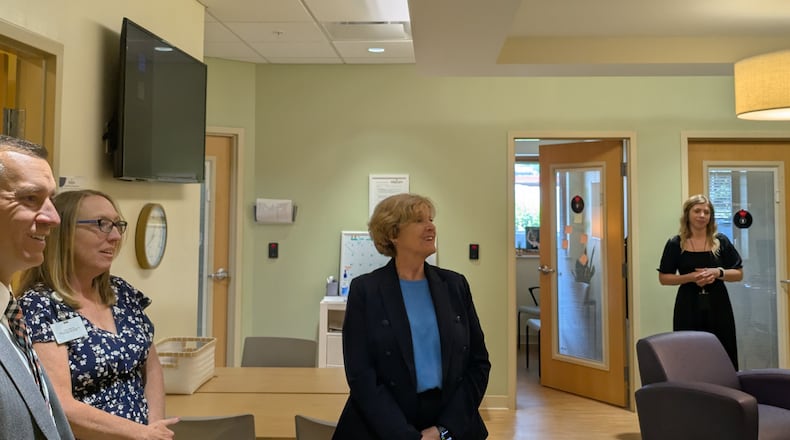“I’m really intrigued by, not just the work that’s happening here and the value of Brigid’s Path, but it really needs to be a national model,” Monroe said.
There are about five newborn recovery centers in the U.S. with Brigid’s Path being the only one in Ohio, according to Jill Kingston, founder and president of Brigid’s Path.
“Over the last 10 years, we’ve been working to get Medicaid (coverage),” Kingston said.
The process to be able to bill Medicaid for services started at the federal level to amend the Social Security Act in 2018, she said.
When the COVID-19 pandemic hit, it slowed that process down at the state level.
“The state has been writing the rules and the rates for Brigid’s Path path to exist in the state for sustainable funding, and we are now waiting for Medicaid to come through,” Kingston said.
Kingston expects they will have the ability to bill Medicaid for its services within about six months, but they’re seeking support to get through the next few months.
“We need the support from the community to come in and help us financially so that we can bridge that gap to till we have that Medicaid sustainable funding,” Kingston said.
The CDC Foundation is reaching out to national funders and other donors to help galvanize donations to bridge that gap, Monroe said.
A mother who was helped by Brigid’s Path also got to meet with Monroe to talk about how the center helped her and her son Asher.
“Their team walked beside me as I fought through recovery during pregnancy and kept going after Asher was born. It wasn’t easy, but they made it possible,” said Ashley Wells, who is from Cincinnati.
When Wells found out she was pregnant with Asher, she was homeless in Cincinnati.
Now, she’s been sober for about 20 months and has custody of Asher, who lives with her and Asher’s father.
“Their team walked beside me as I fought through recovery during pregnancy and kept going after Asher was born,” Wells said. “It wasn’t easy, but they made it possible.”
Brigid’s Path has served nearly 300 babies since 2017. About 85% of the infants they care for are discharged to family care. Of those families, about 70% would have faced foster care without Brigid’s Path, according to Brigid’s Path.
About the Author


